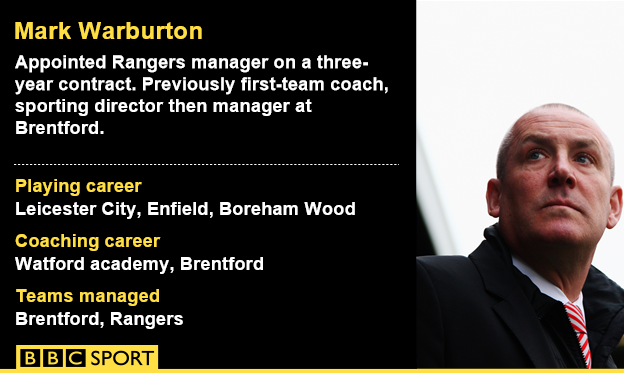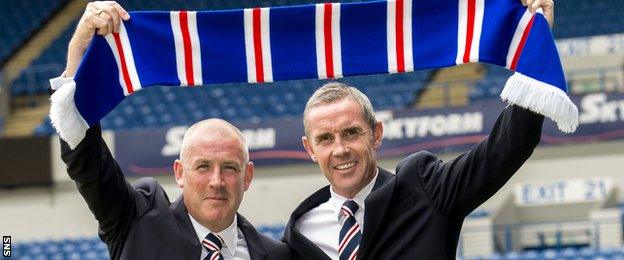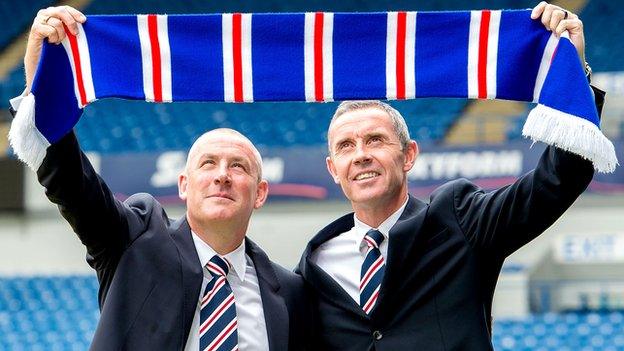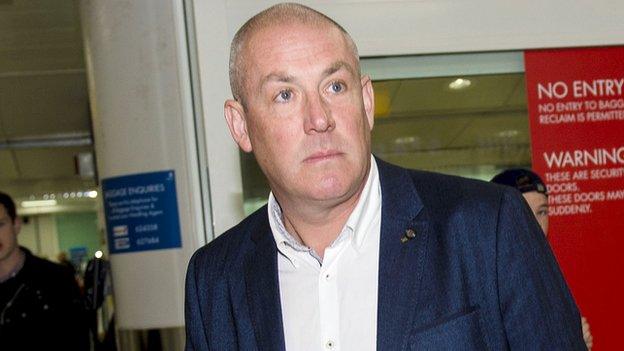Can Mark Warburton translate Brentford success to Rangers?
- Published
- comments
Interview: Rangers manager Mark Warburton
Mark Warburton has a polished profile. Brentford supporters gush about the style of football his team played and the level of achievement attained.
Players and coaches who have worked with Warburton talk about his man-management skills, his positivity and his progressive approach.
The sense is of a complete manager, but Warburton still has much to prove.
An assessment suggests plenty of promise. He talks well, is adept at dealing with the media, and is committed to the foundations of contemporary football: player development, passing/possession play, and the use of analytics.
The element of risk that Rangers have taken on is whether or not he can succeed at a club that is very different from Brentford. It can be said to be a calculated risk.
The story is well enough known. Brentford's owner, Matthew Benham, uses statistical analysis to run his club, and wanted to extend that to player recruitment and tactics.

Warburton did not want to cede as much control as the owner wanted in a new management set-up, and so it was announced in February that he and his assistant David Weir would be leaving the club at the end of the season, regardless of where the side finished in the Championship.
It is a testament to Warburton and Weir's abilities that the team barely faltered, and qualified for the play-offs. They lost to Middlesbrough, but the achievement alone was impressive enough since they significantly out-performed the club's wage budget.
It is evident that Warburton is a good coach and an excellent motivator and man-manager; the task for him now is to overcome the different problems and challenges he will face at Ibrox.
At 52, he has only limited experience in football management. His background as a City trader - his day's work, he has said, often involved a turnover of more than £1bn - means that he has operated in far more stressful situations than managing a high-profile football team in a city that obsesses over the game and the fortunes of two clubs in particular.
Even so, Benham established a strong foundation at Brentford. Warburton arrived at the club in February 2011 as a first-team coach, and later held the position of sporting director, so he was an influential figure himself.
The rise of Warburton's Brentford
At Ibrox, he will find little in the way of a support network, at least for now. The Rangers chairman Dave King envisages a modern football structure at the club, but it will take time to implement. Warburton will need to rely on his contacts to source signings, while the club sets about appointing scouting staff.
The scale of the rebuilding job will only become clear to Warburton when he begins to tackle it. The priority is to sign players who will improve the squad and begin the process of coaching and preparing a team that can mount a title challenge from the moment the season starts in seven weeks.
Warburton had to integrate nine new signings last summer, for his first season in the Championship after guiding the team to promotion during his opening months in charge.
He has often made use of loan signings from Premier League academies - Warburton has strong links with Tottenham, Arsenal, Leicester and Everton, as well as many clubs on the continent after his role in the European youth tournament, the NextGen Series - but there is likely to be less willingness for clubs to send their players to the Scottish Championship.

Mark Warburton will rely on David Weir to help him navigate the world of Scottish football
Warburton's remit is also to build the core of a side capable of competing in the top-flight, not to develop players who then return to their parent clubs.
Weir has continued to monitor the Scottish game closely, though, and they will be aware of the merits of players like Danny Wilson, who left Hearts at the end of last season, Hibernian's Scott Allan and Falkirk's Craig Sibbald.
Warburton and Weir work effectively as a team. The former has been a manager for only 17 months and only at one club, but has many of the skills required to meet the demands at Rangers.
Elements of the job will test him in new ways, and he will likely rely heavily on Weir as he adapts to the very demanding nature of working at Ibrox.
Warburton has also yet to encounter serious setbacks or difficult times in his career, since during his entire spell at Brentford, from February 2011 on, the club never lost more than three games in a row, and that only happened four times.
These were encouraging times for a club that was not burdened by expectations. Life will be more demanding at Ibrox, and the club will need to establish a support network round the new manager quickly.
Warburton is relatively inexperienced, but confident, self-assured, hard working and committed to the approach and style that the Rangers board want implemented at the club.
He and Weir also complement each other's strengths. Their working relationship is said to very much be a partnership, with the two having become friends while Warburton worked for Watford's academy and Weir was a youth coach at Everton.
Those who watched Brentford closely were impressed by the team's approach - Warburton's mantra was that Plan B was to do Plan A better, so no long balls or panicking in possession - but also his ability to manage individuals.
When players were out of form, he was at his most astute, and individuals were only dropped and rested once he had shown to them using video footage or GPS data that they needed time out of the side.
The result was a small squad of extremely committed players - Brentford used the joint fewest number of players in the Championship, and even six of those 24 made fewer than five appearances.
Warburton won 40 of his 78 games in charge of Brentford and has earned the opportunity to test himself in a different environment.
He has the right strategy, the challenge is now to successfully implement it and prove that his judgement is sound.
- Published15 June 2015

- Published15 June 2015

- Published15 June 2015

- Published20 June 2016

- Published7 June 2019
